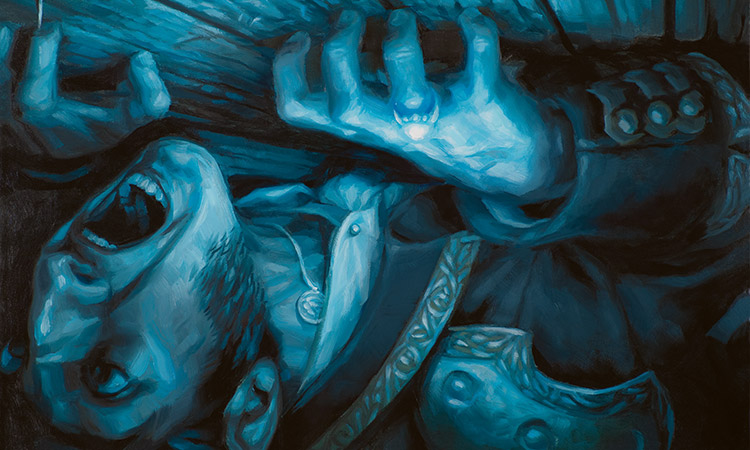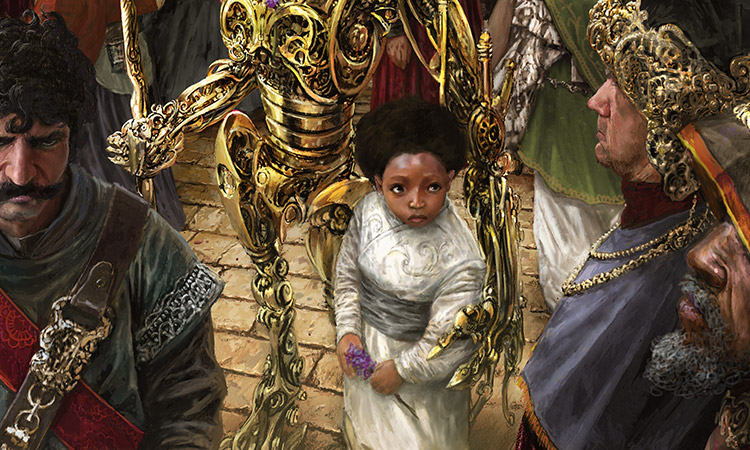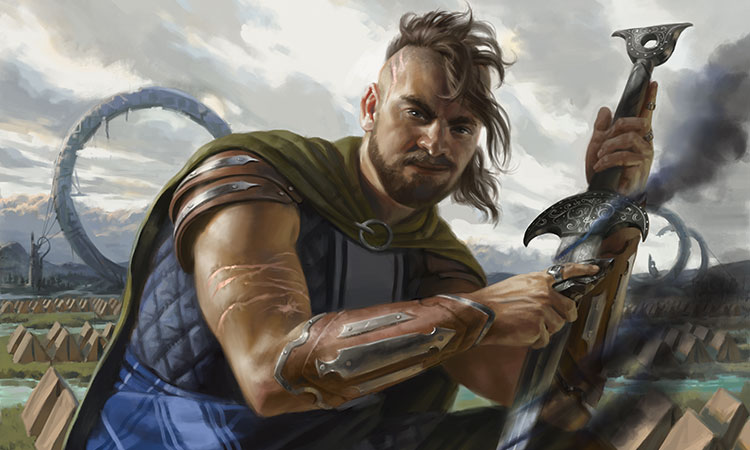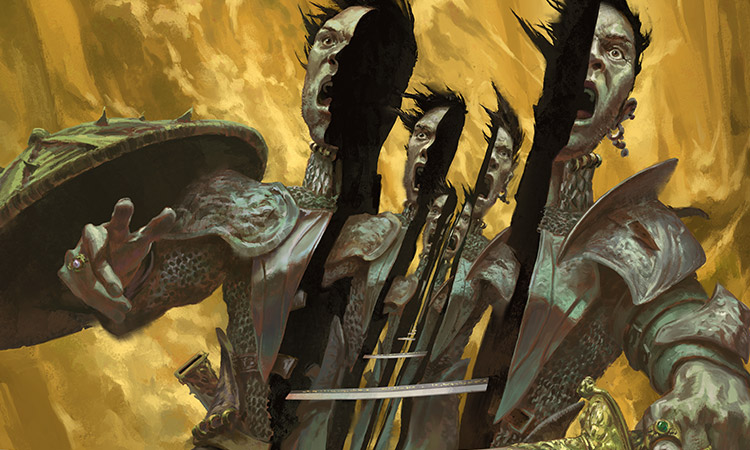Playing Safe and Playing Scared
If you've stuck with Level One this far, then by now you know your fundamentals. You know the basic concepts important to deck building and Magic gameplay. You know the common pitfalls that hit new players, and how to avoid them. As you become a more advanced player, though, there's a fine line you're going to have to walk. Today, we're going to discuss the difference between playing safe and playing scared.
The Benefits of Playing Safe
Playing safe means avoiding risks, and taking the game down a path where catastrophe cannot strike you.
- "I'm not going to play a fourth creature, just in case my opponent casts Languish next turn."
- "I saw Hixus, Prison Warden in Game 1, and those five untapped Plains look very suspicious. I'll make a more conservative attack."
- "I have this game locked up, but don't want to lose if my opponent draws a haste creature. I'll leave my Satyr Wayfinder on defense."
Playing safe is an incredibly important skill to employ when games are even, or when you're ahead. Being a great Magic player means squeezing out every advantage, and giving your opponent as few opportunities as possible to steal games away from you.
When you're ahead in a game, there's a huge difference between taking a line of play that gives you a 90% chance to win, and taking a line of play that gives you an 80% chance to win. If you allow yourself to play recklessly and leave doors open for your opponents to make a comeback, your results will suffer for it in the long run.
The Dangers of Playing Scared
But playing safe has a dangerous evil twin! Players will often think they're playing safe, when in reality they're playing scared. Make every effort to learn the difference between the two.
- "I'm not gonna block with my Sylvan Caryatid; what if my opponent has Titan's Strength!?"
- "I suspect my opponent has Clash of Wills. I'm not going to cast anything until they tap out!"
- "If I hold this Foundry Street Denizen in my hand, I'll have something to rebuild if my opponent casts End Hostilities."
One danger of playing scared is that you can sometimes allow yourself to lose the game, even if your opponent doesn't have the card you're worried about!
It's good to think about the possibility of a permission spell, but how can you win if you don't cast your spells?
Your mono-red deck will inevitably be scared of Languish, but if you hold back your creatures, you might instead lose to a Siege Rhino, or to an opponent with two spot removal spells.
Another grave danger of playing scared is giving your opponent extra draw steps. Players are prone to false logic such as "the only card I can lose to is Dragonlord Atarka, so I'll play around it!" Most games are far more complicated than that. If you play conservatively and give your opponent a handful of extra draw steps, there's likely to be some turn of events that you hadn't considered that could cause you to lose.

Claustrophobia | Art by Ryan Pancoast
An Example: Walking the Fine Line
Recently, I played a game with a Blue-Black Control deck where I had stabilized at a low life total against a Red-Black Dragons deck. I didn't want to lose to Stormbreath Dragon or Kolaghan, the Storm's Fury, so I declined to attack with my Silumgar, the Drifting Death for a few turns, until I had drawn a second flying blocker.
Well, my opponent didn't draw a haste dragon, but what he did draw was a Thunderbreak Regent to block, and since I'd missed an attack, I was forced to give him one more draw step than I'd counted on. Wouldn't you know it, that final draw step was a burn spell, and I lost the game!
Did I play safe, or did I play scared? It's hard to say, but what I do know is that there's tremendous danger in giving your opponent extra draw steps, even when you think you've planned for all eventualities.
How to Play Safe without Playing Scared
The first step is to evaluate whether or not you have the luxury of playing safe. Often, this will involve gauging how well the game is going for you, and how likely you are to win if it drags on.
Is your opponent racing you in the air with Dragonlord Ojutai? Well, you can probably no longer afford to play around Crux of Fate.
Are you at one life against a burn deck? You need to be aggressive and give them as few draw steps as possible.
As a general rule, it's a bad idea to play too slowly against late game control decks. Ironically, control decks are most often the ones playing the permission spells and board sweepers that you'd normally want to play around. Unfortunately, in many cases, trying to mitigate the damage of an End Hostilities is a losing battle. It's playing scared, not playing safe.
These control decks tend to be so powerful in the late game that they're likely to win if they have a clean board state on turn five, whether or not you've held back creatures. After all, you might cast a Foundry Street Denizen and a Goblin Piledriver to rebuild, but those cards will be virtually useless if your opponent follows up with Elspeth, Sun's Champion!
Of course, all of this depends on the particulars of the situation—and there are certainly times when you should hold back a creature or two. However, when in doubt, I recommend trying to close the game as quickly as possible. The more you hold back, the more time your opponent will have to deploy his or her powerful late game cards.

Guardian Automaton | Art by Vincent Proce
So when should you play safe? Playing safe is a good idea when the game is going well for you, and when you want it to be longer instead of shorter.
If you've evaluated the game state and decided that you do have the luxury to play safe, your second step is to think about the worst case scenario. Or, more accurately, think about the realistic ways that things could go poorly for you.
"It would be bad if my opponent draws a removal spell for my blocker."
Third, think about what you can do to mitigate those risks.
"I could hold back an extra creature!"
Fourth, weigh the pros and cons of that decision.
"If I hold back, I'll survive the next turn no matter what, but I'll have to give my opponent two extra draw steps. Plus, if they do remove my biggest blocker, I'll have to start chump blocking and might lose anyway. . ."
Finally, act on your decision—but remember to reevaluate often if anything changes.
Get to Know Your Instincts
Some players naturally lean toward being aggressive, and don't play safe as often as they should. Other players naturally lean toward being conservative, and too often cross the line into playing scared. I'd like to share a very important concept that Hall of Fame pro Zvi Mowshowitz once highlighted:
". . .You need to get to know your instincts. It's not about good or bad instincts, it's about the biases that your instincts display. Watch to see which way you naturally lean. If you tend to focus on controlling the game all the time, then when the decision is close, choose the non-controlling path. If you tend to be hyper-aggressive, this is where you hold back. That helps protect you from yourself. . ."
Knowing yourself is important. It can help you avoid mistakes and is essential for growth as a player.
There was a point for me, a few years back, where I identified my own natural leaning towards being conservative. It wasn't inherently a bad thing; I still felt I was playing well, and that most of my decisions were sound. However, when I did make a mistake, it was much more likely to be because I was playing too conservatively than because I was playing too aggressively. In other words, I was playing scared too often.
So I began to play my games with that knowledge at the forefront of my mind. When I faced a close decision, I would say to myself, "Reid, you have a tendency to play scared too often, is this one of those times?" It wasn't any kind of cataclysmic change in my play style, it was just a slight recalibration to a gauge that was a little off-center. I learned that I should go for it when I smelled blood, and that I shouldn't pass up opportunities for advantage.

Graveblade Marauder | Art by Jason Rainville
When You're at Risk of Playing Scared
There are a few noteworthy sets of circumstances where players are at particular risk of playing scared.
One is when the texture of the game has shifted. Playing while you're ahead and playing while you're behind require two somewhat different thought processes, and it's not always easy to switch between the two.
If a player has been ahead in the game for a while, but something goes wrong and things are beginning to slip away, they're at risk of playing scared. It's because they've been in the mentality of playing safe, but now the game has taken a turn where he or she might no longer have the luxury of doing so.
The opposite can happen too. Imagine you're playing an aggressive deck, and feel pressure to end the game as quickly as possible. This might be the right way to play in most situations, but circumstances can also arise where you have a firm hold over the game, and ought to start playing safe. For example, you get your opponent down to a low life total, and have a burn spell to finish them off. You might be at risk of getting over-excited, and rushing to try to win, when in reality you should play safe, and wait for a moment when your opponent doesn't have mana open for a possible permission spell.
Another situation arises when a player first moves upwards to a new level of competition. I know this from experience.
Take, for example, a player who puts up great results in Friday Night Magic. He or she has played at the local store for months or years, and is one of the best players. They know that if they carefully play a long game, leaving few openings for things to go wrong, they'll beat most of their opponents via their edge in skill and experience.
When a player like this moves up to the Regional Pro Tour Qualifier or Grand Prix level, they'll sometimes have a hard time adjusting their play style. Now they're playing against players as good or better than them, and the wins don't come as easily. If they're playing scared and failing to capitalize on opportunities, they'll be at a disadvantage against equally-matched opponents.

Infinite Obliteration | Art by Yeong-Hao Han
Similarly, when players face off against an opponent whom they consider to be particularly skilled, they're at particular risk of playing scared. For different people, it might be playing against a pro player at a Grand Prix, playing against the local all-star, or simply playing against the person who won last week's FNM.
Under such circumstances, players sometimes give their opponent's "too much credit" during gameplay. They don't expect that a strong opponent might be vulnerable. "Surely she has the Clash of Wills!" Or, "He's definitely going to cast Languish next turn!"
The reality, of course, is that every Magic player is merely human (unless they're making a new Air Bud movie that I don't know about). A strong player is no more likely to have Languish in their top ten cards than any other player piloting the same deck. In fact, against strong opponents, you ought to be slightly more willing to take risks, since you can expect them to play well and make fewer mistakes if the game drags on.
Walking the line between playing safe and playing scared is about making an honest evaluation of the game state and of the other factors at play. However, it's important to recognize that we're all human, and there are conditions where our judgment can be clouded. Learn ways to center yourself, and make the best decisions you can. Play safe when it means tightening your hold on the game, but don't play scared when it means giving your opponent too much breathing room.

